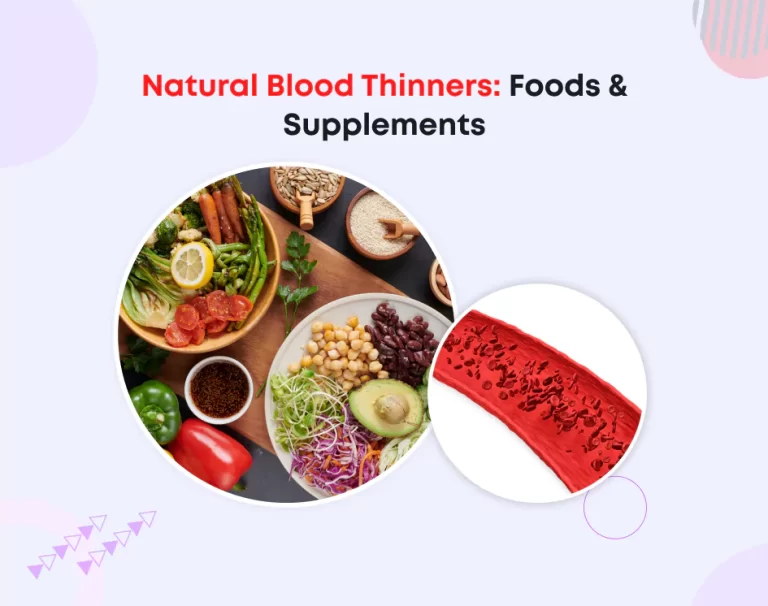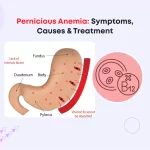
Natural Blood Thinners: Foods & Supplements
Blood plays a crucial role in transporting oxygen and nutrients throughout the body. However, when it becomes too thick, it increases the risk of clot formation, leading to serious health conditions like strokes and heart attacks.
While medications like aspirin and warfarin are common anticoagulants, many people seek natural alternatives to blood thinners for safer health management. In this guide, we will explore various natural blood thinners, including foods, supplements, and lifestyle changes that support healthy circulation.
Natural Blood Thinners: How Do They Work?
Natural anticoagulants help prevent excessive clotting by reducing platelet aggregation and improving blood circulation. These blood-thinning foods and supplements contain compounds like salicylates, omega-3 fatty acids, flavonoids, and vitamin E, which naturally prevent clot formation.
Top Foods That Thin Blood
Incorporating specific foods into your diet can help maintain optimal blood viscosity and circulation. Below are some of the best natural blood thinners:
1. Blood-Thinning Vegetables and Fruits
- Garlic – Contains allicin, which acts as a natural anticoagulant and lowers blood pressure.
- Onions – Rich in flavonoids that prevent blood clot formation.
- Tomatoes – High in salicylates and lycopene, reducing platelet aggregation.
- Berries (Strawberries, Blueberries, Cranberries) – Contain antioxidants and natural salicylates that thin the blood.
- Citrus Fruits (Oranges, Lemons, Grapefruits) – Packed with vitamin C and bioflavonoids that enhance circulation.
- Pineapple – Contains bromelain, which helps break down blood clots.
- Grapes – High in resveratrol, promoting heart health and circulation.
2. Nuts and Seeds
- Almonds and Walnuts – Excellent sources of vitamin E, which naturally prevents clot formation.
- Flaxseeds and Chia Seeds – Rich in omega-3 fatty acids that reduce blood viscosity.
- Sunflower Seeds – Packed with vitamin E and essential fatty acids for circulation.
3. Spices and Herbs as Natural Blood Thinners
- Turmeric – Contains curcumin, a powerful anti-inflammatory that prevents excessive clotting.
- Ginger – Works similarly to aspirin in preventing blood clots.
- Cinnamon – High in coumarin, which has natural anticoagulant properties.
- Cayenne Pepper – Increases circulation and lowers blood pressure.
- Basil – Contains eugenol, a natural blood thinner.
4. Omega-3 Rich Foods
- Fatty Fish (Salmon, Mackerel, Sardines, Tuna) – Omega-3 fatty acids improve heart health and prevent clot formation.
- Seaweed – Contains natural anticoagulants that support circulation.
- Hemp Seeds – Another great source of plant-based omega-3 fatty acids.
5. Whole Grains and Legumes
- Oats and Quinoa – Help lower cholesterol and improve blood circulation.
- Lentils and Beans – Provide fiber and anti-inflammatory benefits.
- Brown Rice – Contains essential nutrients that promote heart health.
Natural Blood Thinners Supplements
In addition to foods, certain supplements can act as natural anticoagulants:
- Vitamin E – Found in almonds, sunflower seeds, and spinach; prevents clot formation.
- Fish Oil – High in omega-3 fatty acids, reducing blood thickness.
- Bromelain – An enzyme from pineapples that helps break down fibrin in blood clots.
- Magnesium – Essential for maintaining healthy blood flow and vessel function.
Lifestyle Changes for Natural Blood Thinning
Besides diet and supplements, certain habits can support blood circulation and reduce clotting risks:
- Stay Hydrated – Dehydration thickens the blood, increasing clot risk.
- Exercise Regularly – Physical activity promotes circulation and prevents stagnation.
- Reduce Stress – Chronic stress leads to inflammation, increasing clot formation.
- Avoid Smoking and Excessive Alcohol – Both can cause blood vessel damage and thickening.
- Get Enough Sleep – Poor sleep patterns contribute to inflammation and clot risk.
- Practice Deep Breathing and Yoga – Improves oxygen flow and blood circulation.
Natural Alternatives to Blood Thinners
While natural blood thinners provide many benefits, they should be used with caution, especially if you are on prescription anticoagulants. Overuse of certain foods or supplements can increase the risk of excessive bleeding. Consult a healthcare professional before making major dietary changes.
Additionally, individuals with clotting disorders or those scheduled for surgery should be mindful of their intake of natural anticoagulants. A balanced approach is essential to prevent unwanted health complications.
Conclusion
Incorporating natural blood thinners into your diet and lifestyle is an effective way to maintain healthy circulation and reduce clotting risks. Blood-thinning vegetables and fruits, omega-3-rich foods, and specific supplements offer powerful anticoagulant benefits. However, balance is key—ensure you monitor your intake and consult a healthcare provider when necessary.
By making informed dietary choices and embracing a healthy lifestyle, you can promote heart health and overall well-being naturally.








